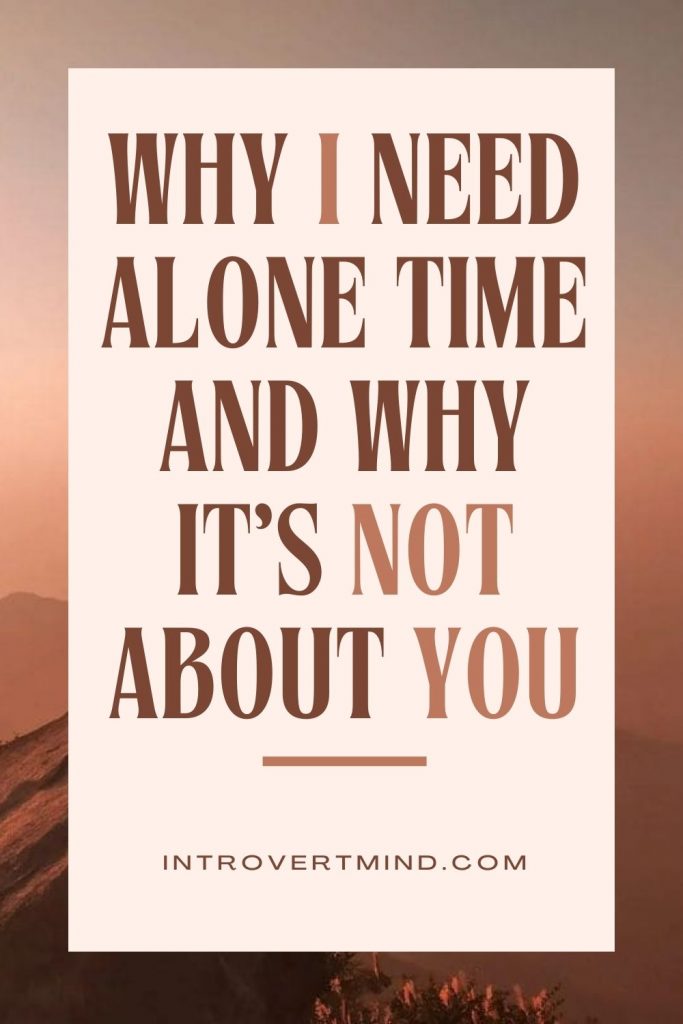Picture this – it’s been a long week, and you only want to curl up on the couch with a good book or binge-watch your favorite TV show. But just as you’re about to settle in, your phone rings.
It’s a friend who wants to hang out or family members who need help with something. You know you should say yes, but all you can think is, “Please, just let me have some alone time.”
If this scenario sounds familiar, besides that this is a typical sign of an introvert, you are not alone. Many people need solitude, but struggle to communicate it to others without feeling guilty or misunderstood.
In this post, we’re going to explore the reasons why some people need alone time, common misconceptions about it, and how to communicate your need for solitude in a way that won’t hurt others’ feelings.
So, if you’re ready to learn more about the benefits of alone time and how to prioritize self-care without feeling guilty, keep reading!
The Importance Of Alone Time – Mental And Physical Health

Do you ever find yourself needing a little “me time,” but feeling guilty for wanting to be alone? Well, it’s time to stop feeling bad about taking a break!
Alone time is super important for your mental and physical health. Have you ever asked yourself why introverts love being alone?
What Is Alone Time?

Alone time means taking a break from the world, normal life, and disconnecting from communication. Taking time for self-reflection.
During alone time, individuals intentionally choose to spend time by themselves, without the company or distraction of others. It can involve engaging in hobbies for introverts or engaging in activities that bring a sense of peace, relaxation, and introspection.
About What Is Alone Time? Why Is It So Important?

It’s not about being a hermit or avoiding your friends – it’s about taking care of yourself, and your mental and physical well-being. Studies show that regular alone time can reduce stress, boost creativity, and help you make better decisions.
But it’s not just about mental health – alone time can benefit your body, too! Research has shown that spending time alone can reduce inflammation in the body, which is linked to all sorts of health problems like heart disease, diabetes, and even cancer.
Don’t just take our word for it, though. Experts agree that alone time is essential for self-care. Psychologist and author Dr. Sherrie Bourg Carter says that taking time to reflect on your life and priorities is crucial for personal growth.
So, don’t feel guilty for needing some alone time. It’s not about rejecting others – it’s about taking care of yourself. Trust us, your mental and physical health will thank you for it!
The Misunderstanding Of Spending Time Alone

Let’s clear up some misconceptions about alone time! Don’t believe the rumors that say people who need alone time are anti-social or avoid social interaction or don’t like being around others. It’s a normal part of self-awareness and a healthy way of self-care that we all need.
Speaking from personal experience, I used to feel guilty for wanting some time to myself. But as I learned more about the benefits of alone time, I realized it’s not about rejecting others, it’s about taking care of ourselves.
And don’t let anyone tell you that only introverts need alone time. Even the most extroverted person needs a break to recharge and reflect. Plus, studies show that regular solitude makes us more sociable, feel good, and empathetic when we do interact with others.
Don’t let anyone shame you into thinking alone time is selfish or indulgent. It’s a vital aspect of self-care that helps us be our best selves, just like exercise and healthy eating. So, let’s ditch those misconceptions and make alone time a priority for our mental and physical health!
How To Communicate Your Need For Alone Time

Communicating your need to spend time alone can be challenging, especially when it involves telling friends, your partner, family, or coworkers that you need some space.
However, it’s important to remember that setting boundaries and prioritizing your well-being is necessary for a healthy and happy life.
Strategies And Tips For Communicating Need For Spending Time Alone

Here are some tips and strategies for effectively communicating your need for alone time without hurting others’ feelings:
- BE HONEST: It’s important, to be honest with yourself and with others about your need for alone time. Let them know that it’s not about them, but rather a personal need that you have to take care of yourself, that you have to clear your brain, take a walk, just some little things…
- SET BOUNDARIES: Be clear about your boundaries and what you need from others. For example, if you need an hour of alone time in the evening, let them know when and for how long.
- USE “I” STATEMENTS: Use “I” statements instead of “you” statements when communicating your needs. Instead of saying “You never give me any space!” try saying “I feel like I need some alone time to recharge and focus on my mental health.” This way, you are expressing your needs without placing blame on the other person or making them feel defensive.
- OFFER ALTERNATIVES: If you’re declining an invitation or request, offer an alternative that works better for you. For example about social interactions, if you can’t make it to a group outing, suggest a one-on-one hangout instead.
- BE CONSISTENT: Once you set boundaries and communicate your needs, it’s important to stick to them. This can help others understand and respect your need for alone time.
- PRACTICE SELF-CARE: Finally, make sure to practice self-care and prioritize your alone time. This can help you feel more comfortable communicating your needs to others and help you maintain a healthy work-life balance.
The Key To Embracing Alone Time Is Effective Communication

Communicating your need for alone time can be challenging, but it’s important for your well-being.
By being honest, setting boundaries, using “I” statements, offering alternatives, being consistent, and practicing self-care, you can effectively communicate your needs without hurting others’ feelings.
Remember, prioritizing your own needs is not selfish, but necessary for a happy and healthy life. So, don’t be afraid to take that alone time and recharge your batteries. Your mental health will thank you!
Why It’s Not About You That I Need A Little Alone Time

Don’t take it personally when someone says they need alone time! It’s not about you, it’s about their well-being, so no need to take it personally.
It’s not like in a bad breakup when they say “it’s not you, it’s me”. This time, it’s really just about them and their need to recharge. So, no need to feel rejected or hurt, just let them have their alone time and chill out!
We all need different ways to recharge and process our emotions, and sometimes that means being alone.
Don’t feel guilty or selfish for taking time for yourself – it’s important to prioritize your mental health! Just make sure to communicate your needs in a kind and understanding way to avoid any misunderstandings.
Remember, taking care of yourself is the first step to maintaining healthy relationships!
My Need For Alone Time Is Not A Reflection On You – It Is About Mental Health And Much More

Alrighty! It’s time to wrap things up and remind ourselves that needing alone time is totally normal and healthy.
It’s not about sending a message to others that we don’t like their company – it’s all about taking care of our mental health, so we can be our best selves.
So, let’s keep the communication lines open and find ways to let our loved ones know that we need a little time to recharge our batteries. By doing so, we can maintain healthy relationships while prioritizing our well-being.
Remember, self-care is key, so let’s make sure we’re taking the time we need to be the best versions of ourselves!
Time spent alone is time good spent!


